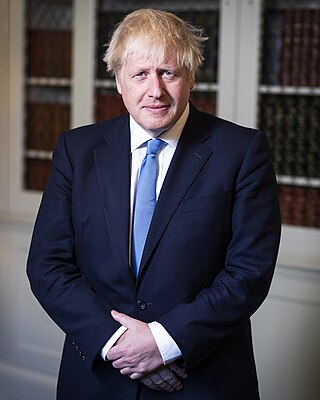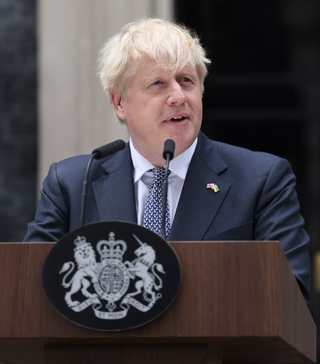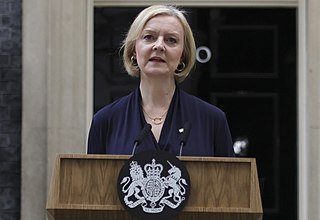
Tobias Martin Ellwood is a British Conservative Party politician and soldier who has been the Member of Parliament (MP) for Bournemouth East since 2005. He chaired the Defence Select Committee from 2020 to 2023, and was a Government Minister at the Ministry of Defence from 2017 to 2019. Prior to his political career, Ellwood served in the Royal Green Jackets and reached the rank of captain. He transferred to the Army Reserve and has gone on to reach the rank of lieutenant colonel in the 77th Brigade.

Sir Keir Rodney Starmer is a British politician and barrister who has served as Leader of the Opposition and Leader of the Labour Party since 2020. He has been Member of Parliament (MP) for Holborn and St Pancras since 2015. He was previously Director of Public Prosecutions from 2008 to 2013.

Matthew James Offord is a British Conservative Party politician who has been the Member of Parliament (MP) for Hendon since 2010. He was previously a member of the Association of European Parliamentarians with Africa Governing Council.

Julian Richard Smith is a British politician who served as Government Chief Whip from 2017 to 2019 and Secretary of State for Northern Ireland from 2019 to 2020. A member of the Conservative Party, he has been the Member of Parliament (MP) for Skipton and Ripon since 2010.

Angela Rayner is a British politician serving as Deputy Leader of the Labour Party since 2020 and Shadow Deputy Prime Minister of the United Kingdom and Shadow Secretary of State for Levelling Up, Housing and Communities since 2023. Rayner has been Member of Parliament (MP) for Ashton-under-Lyne since 2015. She ideologically identifies as a socialist and as being part of Labour's soft left.

Boris Johnson's term as the prime minister of the United Kingdom began on 24 July 2019 when he accepted an invitation of Queen Elizabeth II to form a government, succeeding Theresa May, and ended on 6 September 2022 upon his resignation. While serving as prime minister, Johnson also served as the first lord of the treasury, minister for the civil service, and leader of the Conservative Party. He also served as minister for the union, a position he created to be held concurrently with the duties of prime minister, becoming the first prime minister to adopt the title. Johnson's premiership was dominated by Brexit, the COVID-19 pandemic, the Russian invasion of Ukraine, and the cost of living crisis. His tenure was also characterised by several political controversies and scandals, being viewed as the most scandalous premiership of modern times by historians and biographers.
At various dates in the run up to the next United Kingdom general election, various organisations have carried out opinion polling to gauge the opinions that voters hold towards political leaders. The polling companies listed are members of the British Polling Council (BPC) and abide by its disclosure rules. The date range for opinion polls is from the 2019 United Kingdom general election, held on 12 December, to the present day.

Lia Nici-Townend is a British Conservative Party politician. She has been Member of Parliament (MP) for Great Grimsby since the 2019 general election. She served as an Assistant Government Whip from September to October 2022.

Christian Wakeford is a British politician serving as Member of Parliament (MP) for Bury South since the 2019 United Kingdom general election. Elected as a Conservative, he crossed the floor to Labour in 2022.

Partygate is a political scandal in the United Kingdom about gatherings of government and Conservative Party staff during the COVID-19 pandemic in 2020 and 2021, when public health restrictions prohibited most gatherings. The scandal contributed to Boris Johnson's downfall as Prime Minister and his resignation as an MP.
A list of events relating to politics and government in the United Kingdom during 2022.
The July–September 2022 Conservative Party leadership election was triggered by Boris Johnson's announcement on 7 July 2022 that he would resign as Leader of the Conservative Party and Prime Minister of the United Kingdom, after a series of political controversies.
A by-election for the United Kingdom parliamentary constituency of Wakefield was held on 23 June 2022. It was triggered by the resignation, on 3 May 2022, of Member of Parliament (MP) Imran Ahmad Khan, who was elected as a Conservative at the 2019 general election and resigned following a criminal conviction for child sexual assault. Ahmad Khan was subsequently jailed for 18 months.

Beergate was a British political controversy concerning allegations that an event in Durham on 30 April 2021, attended by Labour Party leader Keir Starmer and Deputy Leader Angela Rayner, could have been in breach of COVID-19 lockdown restrictions. Labour and Starmer said, at the time and since, that the event complied with the rules for work gatherings, with a pause for food. The police, after investigating, cleared the Labour attendees, including Starmer and Rayner.

On 6 June 2022, a vote of confidence was held amongst Conservative Party MPs on the prime minister, Boris Johnson's, leadership of their party. Johnson won the vote with the support of 211 Conservative members of Parliament, 58.8% of the total. Out of 359 MPs, 148 (41.2%) voted against him.

In early July 2022, 62 of the United Kingdom's 179 government ministers, parliamentary private secretaries, trade envoys, and party vice-chairmen resigned from their positions in the second administration formed by Boris Johnson as Prime Minister, culminating in Johnson's resignation on 7 July. Johnson's premiership had been considered in danger for months after several scandals, but it was the Chris Pincher scandal that was identified to have spurred on the resignations. Considered the "last straw" for the Prime Minister, the scandal arose after it was revealed that Johnson had promoted his Deputy Chief Government Whip Chris Pincher, who was publicly facing multiple allegations of sexual assault, to the position despite knowing of the allegations beforehand.

Liz Truss's tenure as Prime Minister of the United Kingdom began on 6 September 2022 when she accepted an invitation from Queen Elizabeth II to form a government, succeeding Boris Johnson, and ended 49 days later on 25 October upon her resignation. While prime minister, Truss also served as First Lord of the Treasury, Minister for the Civil Service, and Minister for the Union.
The October 2022 Conservative Party leadership election was triggered by Liz Truss's announcement that she would resign as Leader of the Conservative Party and Prime Minister of the United Kingdom, amid an economic and political crisis.

In September and October 2022, the Conservative Party government led by newly appointed prime minister Liz Truss faced a credibility crisis. It was caused by the September 2022 mini-budget and a disorganised vote in the House of Commons over a parliamentary vote to ban fracking, ultimately resulting in the loss of support of Conservative members of parliament (MPs).
















